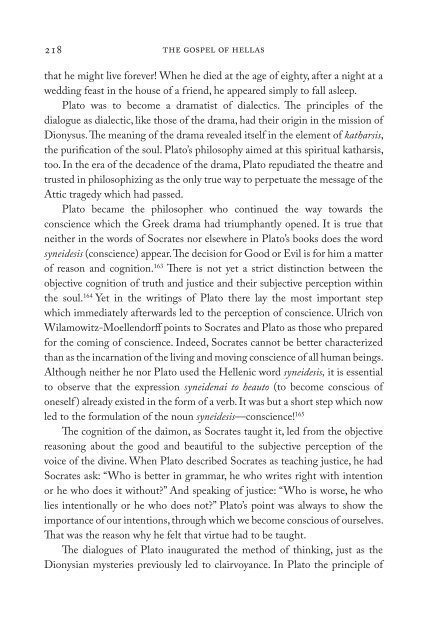The Gospel of Hellas - Research Institute for Waldorf Education
The Gospel of Hellas - Research Institute for Waldorf Education
The Gospel of Hellas - Research Institute for Waldorf Education
You also want an ePaper? Increase the reach of your titles
YUMPU automatically turns print PDFs into web optimized ePapers that Google loves.
the gospel <strong>of</strong> hellas<br />
that he might live <strong>for</strong>ever! When he died at the age <strong>of</strong> eighty, after a night at a<br />
wedding feast in the house <strong>of</strong> a friend, he appeared simply to fall asleep.<br />
Plato was to become a dramatist <strong>of</strong> dialectics. <strong>The</strong> principles <strong>of</strong> the<br />
dialogue as dialectic, like those <strong>of</strong> the drama, had their origin in the mission <strong>of</strong><br />
Dionysus. <strong>The</strong> meaning <strong>of</strong> the drama revealed itself in the element <strong>of</strong> katharsis,<br />
the purification <strong>of</strong> the soul. Plato’s philosophy aimed at this spiritual katharsis,<br />
too. In the era <strong>of</strong> the decadence <strong>of</strong> the drama, Plato repudiated the theatre and<br />
trusted in philosophizing as the only true way to perpetuate the message <strong>of</strong> the<br />
Attic tragedy which had passed.<br />
Plato became the philosopher who continued the way towards the<br />
conscience which the Greek drama had triumphantly opened. It is true that<br />
neither in the words <strong>of</strong> Socrates nor elsewhere in Plato’s books does the word<br />
syneidesis (conscience) appear. <strong>The</strong> decision <strong>for</strong> Good or Evil is <strong>for</strong> him a matter<br />
<strong>of</strong> reason and cognition. 163 <strong>The</strong>re is not yet a strict distinction between the<br />
objective cognition <strong>of</strong> truth and justice and their subjective perception within<br />
the soul. 164 Yet in the writings <strong>of</strong> Plato there lay the most important step<br />
which immediately afterwards led to the perception <strong>of</strong> conscience. ulrich von<br />
Wilamowitz-Moellendorff points to Socrates and Plato as those who prepared<br />
<strong>for</strong> the coming <strong>of</strong> conscience. Indeed, Socrates cannot be better characterized<br />
than as the incarnation <strong>of</strong> the living and moving conscience <strong>of</strong> all human beings.<br />
Although neither he nor Plato used the Hellenic word syneidesis, it is essential<br />
to observe that the expression syneidenai to heauto (to become conscious <strong>of</strong><br />
oneself ) already existed in the <strong>for</strong>m <strong>of</strong> a verb. It was but a short step which now<br />
led to the <strong>for</strong>mulation <strong>of</strong> the noun syneidesis—conscience! 165<br />
<strong>The</strong> cognition <strong>of</strong> the daimon, as Socrates taught it, led from the objective<br />
reasoning about the good and beautiful to the subjective perception <strong>of</strong> the<br />
voice <strong>of</strong> the divine. When Plato described Socrates as teaching justice, he had<br />
Socrates ask: “Who is better in grammar, he who writes right with intention<br />
or he who does it without?” And speaking <strong>of</strong> justice: “Who is worse, he who<br />
lies intentionally or he who does not?” Plato’s point was always to show the<br />
importance <strong>of</strong> our intentions, through which we become conscious <strong>of</strong> ourselves.<br />
That was the reason why he felt that virtue had to be taught.<br />
<strong>The</strong> dialogues <strong>of</strong> Plato inaugurated the method <strong>of</strong> thinking, just as the<br />
Dionysian mysteries previously led to clairvoyance. In Plato the principle <strong>of</strong>

















